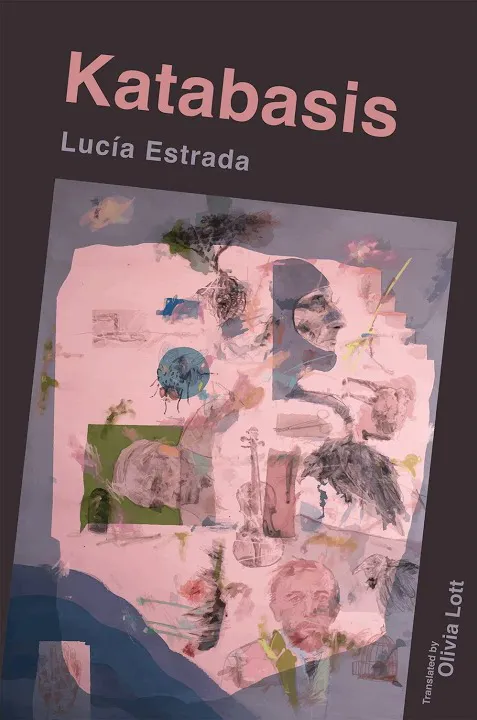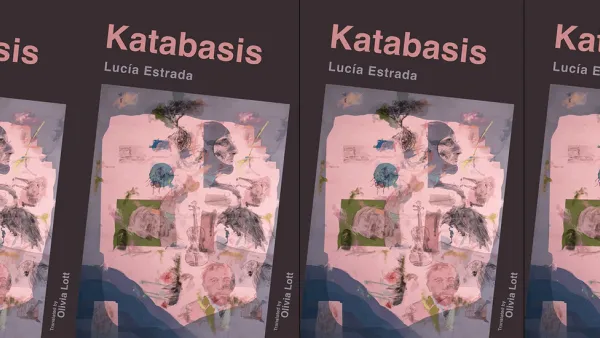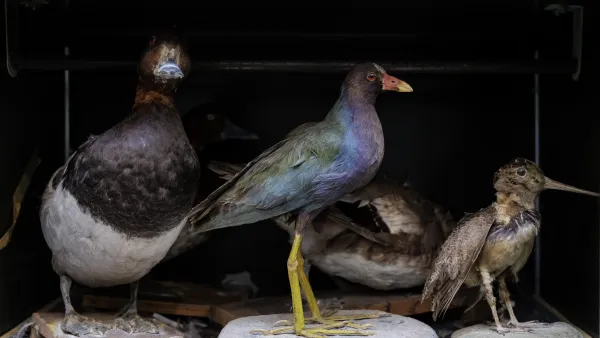“Olivia Lott’s translation of Katabasis by Lucía Estrada makes a critical contribution to the discourse around translation practice” — such is the high praise for Hispanic Studies PhD candidate Oliva Lott’s recent translation of the first full collection of poetry by a Colombian woman to be published in English, this time written up in the Kenyon Review. The reviewer later continues, “Much writerly research went into ‘building the English,’ to use Lott’s words. (Her translator’s note is in itself a stunning piece of writing.) Often when translators speak of research, they mean getting place names right, finding equivalent idiomatic expressions, or gathering specific knowledge required to explain cultural references. Lott researched her way into the particular English-language choices that make up these powerful poems.”
This careful work was recognized with a prized spot as a finalist for the 2021 PEN Award for Poetry in Translation (winners to be announced in April). Below, we asked Lott, who is also a Graduate Student Fellow in the Center for the Humanities, about the process of bringing Katabasis to new audiences, about her reaction to the PEN shout-out, and for her recommendations of additional must-read translated poetry books.
[Editor’s note: This article was updated to reflect PEN’s February 10, 2021 announcement that named Katabasis to its list of finalists for its Award for Poetry in Translation. An earlier announcement named the book to its longlist.]

How were you introduced to the Colombian poet Lucía Estrada? And this work in particular?
The story starts several years back. As an undergraduate at Kenyon College, I was fortunate to be able to study literary translation with Prof. Katherine M. Hedeen, an incredible translator of Latin American poetry. I worked with her to translate another Colombian poet, Raúl Gómez Jattin (1945-1996), as part of my senior honors thesis. This really sparked my interest in poetry from the country and led me to apply for a Fulbright grant to Colombia. There, I taught English to university students on the weekdays and spent my weekends travelling around the country to meet young poets and learn about their work. Two of my Kenyon professors had put me in touch with a few writers in Bogotá and my network grew from there. Lucía Estrada was one of those poets. We met in Medellín in 2015 and I started translating her poems on my flight back to Bogotá. I read Katabasis, or Katábasis in Spanish (the word originates in Greek and means “descent”), a few years later after it came out in 2018.
Why did you think it was important to bring to an English-reading audience?
For one, Katabasis is a consequential book in Colombia. It was awarded the Bogotá Poetry Prize in 2017 and named a finalist for the Colombian National Poetry Prize in 2019. I translated it, most of all, because I loved it and I wanted more people to be able to read it. I consider literary translation an equally creative and political art, so both impulses drove this project. Poetry from Colombia is among the least represented in English-language translation. Katabasis is just the second book-length translation of a Colombian poet to be published in the United States in at least the past 20 years. More shocking, still, it is the first on record of a woman poet from Colombia. These statistics are truly jarring, especially considering that Colombia is the third-largest Spanish-speaking country in the world (only behind Mexico and the U.S.) as well as the way contemporary Colombia tends to be represented in mainstream media in the U.S. There is an urgent need for more (in quantity), but also more in terms of complexity. My hope is that Katabasis can contribute to widening the representational arc, and also to nuancing conversations around what it means to write from Colombia in the 21st century.

What is the process of bringing a translation to publication? Do you reach out to the poet first? And then what?
The first step is to secure the rights to translate the book. Most poets own their copyright (rather than a publisher) and don’t work with agents, so this can be as simple as emailing the poet to ask permission. It becomes more complicated when the writer is no longer living because it can be hard to identify the copyright holder. Then, after working on the project (usually corresponding with the poet, asking questions), most translators submit excerpts to literary journals to help spark interest in the project. Some apply for grants to offset publishing costs. From there, it is common to query publishers to ask if they’d like to take a look at the manuscript. You can also send “cold” to presses with open reading periods, which is what I did when I sent Katabasis to Eulalia Books. I was fortunate that Eulalia, the first press I considered, said yes, so the process moved pretty quickly. All in all, it often takes years to place a book with a publisher.
How long did you work on the translation? What was the most challenging or surprising part of the journey?
I spent about a year working on the project, on and off given the demands of the PhD program in Hispanic Studies. Through the Graduate Certificate in Translation Studies, I was also able to work on excerpts of the project through some of my coursework. I translated Estrada for a “Translation Module” with Prof. Ignacio Infante, and a whole section of Katabasis in “Literature in the Making,” a Comparative Literature course with Profs. Matthias Göritz and Lynne Tatlock. I also workshopped the project with the WashU Translators Collective, a writing group sponsored by the Center for the Humanities. The most challenging part was definitely finishing the first draft of the translation. It takes time to get into the voice, to develop a poetics for the translation that is true to the original Spanish while also standing alone as poetry in English.
What other poets/works would you recommend that have been recently translated?
Here are a few of my recent poetry-in-translation favorites: Sky-Quake: Tremor of Heaven by Vicente Huidobro (translated by Ignacio Infante and Michael Leong), Scorpionic Sun by Mohammed Khaïr-Eddine (translated by Conor Bracken), Scardinelli by Friederike Mayröcker (translated by Jonathan Larson), from a red barn by Víctor Rodríguez Núñez (translated by Katherine M. Hedeen), Selected Works by Yi Sang (translated by Jack Jung, Don Mee Choi, Sawako Nakayasu, and Joyelle McSweeney).
What was your first reaction when you heard about your translation of Katabasis being named to the PEN longlist?
I was overjoyed! I sent Lucía Estrada a message right away and we celebrated together. We’re both so honored to be listed alongside poets, translators and presses we deeply admire. I’ve been blown away by the enthusiastic support for Katabasis (including from the humanities center – thank you!). I’m so happy Estrada’s work is getting out there in English and, that Eulalia Books — a new, cutting-edge press — is getting on more folks’ radars.




